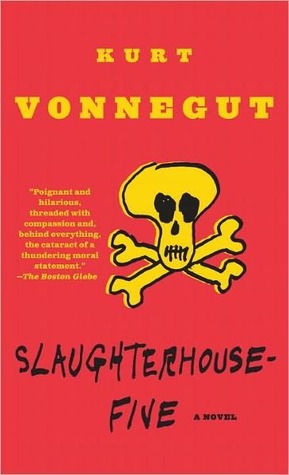Slaughterhouse-Five is the story of Billy Pilgrim, an ill-trained American soldier and his experience in World War II
War is inevitable, and it is absurd. The main theme of the book focuses on this. Billy Pilgrim is a prisoner-of-war at the hands of the Germans. He is captured and put in a disused slaughterhouse, which eventually proves to be a safe ‘shelter’ when his life is spared during the bombing of Dresden.
Billy is a fatalist. Barely out of childhood, his lack of enthusiasm for war and the eventual consequences of the war on his life is what makes up the story of Billy’s life. Vonnegut uses Billy to show that war is unnecessarily glorified, due to which people overlook the real tragedies and trauma that war actually brings with it.
Billy’s journey through time and space, his accounts of the bombing at Dresden, and his life as a prisoner of war, all highlight the central theme in the novel, war is nothing but another form of hell. Dark humour and irony is what makes Slaughterhouse-Five unique and a perfect example of creative accomplishment. It conveys the bitterness of war, while providing comic relief along with crucial understanding of the working of the human mind.
Billy is a fatalist. Barely out of childhood, his lack of enthusiasm for war and the eventual consequences of the war on his life is what makes up the story of Billy’s life. Vonnegut uses Billy to show that war is unnecessarily glorified, due to which people overlook the real tragedies and trauma that war actually brings with it.
Billy’s journey through time and space, his accounts of the bombing at Dresden, and his life as a prisoner of war, all highlight the central theme in the novel, war is nothing but another form of hell. Dark humour and irony is what makes Slaughterhouse-Five unique and a perfect example of creative accomplishment. It conveys the bitterness of war, while providing comic relief along with crucial understanding of the working of the human mind.
~~~~~~~~~~~~~~~~~~~~~~~~~~~~~~~~~~~
This was an interesting read for me. It is definitely in the same vain as Catch-22 in it's use of irony, humor, and an almost senseless story line, although I enjoyed this book much more than Catch-22. The story is borderline absurd, and yet Billy Pilgrim is an interesting character. He is hardly the typical leading man, yet one can't refrain from feeling sorry for him and his plight to do the best he can with the hand he has been dealt.
There are of course many parallel's between the absurdity of Billy Pilgrim's life and the war itself. It's lack of structure mirrors the chaos of war. There is no real central story line and the story jumps back and forth between past, present, future, Earth, and Tralfamdor. In a word, it's...pointless. Just like war. The phrase "so it goes" is repeated after every mention of death in the novel, seemingly to point out that death is inevitable for us all and that the universe couldn't care less about the death of any individual. Another parallel. It's an anti-war novel, but even the story itself can't seem to pin down it's exact identity. Is it a Science-Fiction novel? A war novel? Something else entirely?
But perhaps that's the point. Trying to wrap your head around something so incomprehensible as war, is like finding yourself trapped in an endless, inescapable time loop, leading nowhere (except perhaps death). So it goes.
2015 Reading Challenge: A banned book

No comments:
Post a Comment